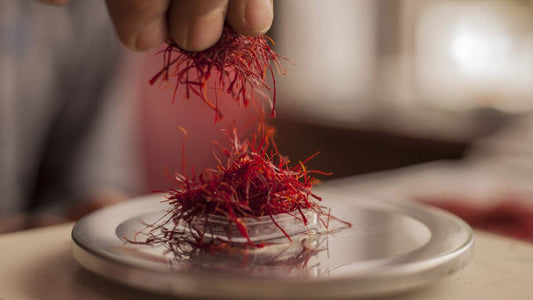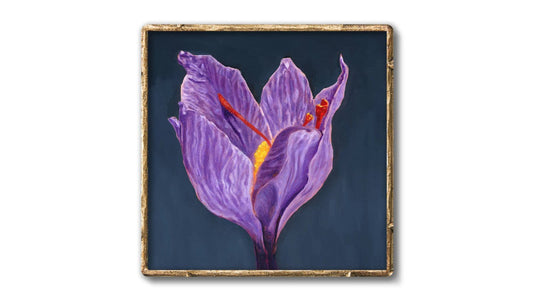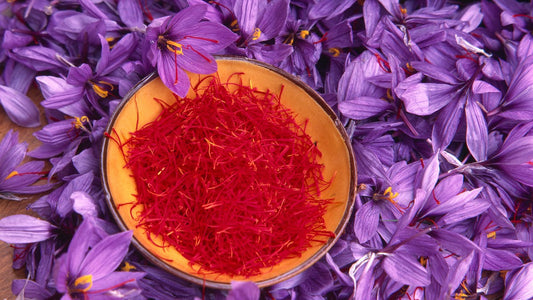
Saffron and PMS Relief: A Natural Remedy for Women
Ara OhanianShare
Premenstrual Syndrome (PMS) affects millions of women worldwide, causing physical and emotional discomfort that can disrupt daily life. While there are numerous remedies for managing PMS, one natural solution gaining recognition is saffron. Known as the “golden spice,” saffron has been praised for its potential to alleviate PMS symptoms, making it a holistic choice for women seeking relief.
In this blog post, we’ll dive into the connection between saffron and PMS relief, explore the science behind its benefits, and share tips on how to incorporate it into your routine for maximum benefits.
What is PMS and Why Does It Happen?
PMS, or Premenstrual Syndrome, refers to a collection of physical, emotional, and behavioral symptoms that occur in the luteal phase of the menstrual cycle, typically 1-2 weeks before menstruation begins. Common symptoms of PMS include:
- Mood swings and irritability
- Anxiety and depression
- Fatigue and low energy
- Food cravings
- Bloating and abdominal discomfort
- Headaches
The exact cause of PMS is not fully understood, but it’s believed to be linked to hormonal fluctuations, particularly changes in estrogen and progesterone levels, as well as serotonin imbalances in the brain. This is where saffron comes into the picture. Emerging research suggests that saffron might help balance these hormonal and serotonin shifts, offering relief from PMS symptoms.
How Does Saffron Help with PMS Relief?
Saffron is derived from the Crocus sativus flower and has been used for centuries in traditional medicine for its therapeutic properties. Modern science is now uncovering how saffron can be effective in managing PMS symptoms. Here are some key mechanisms:
1. Boosts Mood and Reduces Anxiety
Saffron contains active compounds such as crocin, crocetin, and safranal, which have been shown to influence serotonin levels in the brain. Serotonin, often referred to as the “happiness hormone,” plays a crucial role in regulating mood. By boosting serotonin activity, saffron can help reduce mood swings, irritability, and anxiety commonly associated with PMS.
2. Alleviates Depression
Studies have demonstrated that saffron has antidepressant properties comparable to certain pharmaceutical medications, but without the harsh side effects. For women experiencing depression as part of their PMS symptoms, saffron can be a natural and effective alternative.
3. Reduces Physical Discomfort
Saffron’s anti-inflammatory and antioxidant properties can help reduce physical symptoms such as bloating, cramping, and headaches. Additionally, saffron may improve blood circulation, which can further alleviate PMS-related discomfort.
4. Regulates Hormonal Changes
Hormonal imbalances are one of the primary culprits behind PMS symptoms. Saffron may help stabilize estrogen and progesterone levels, reducing the severity of symptoms and promoting overall hormonal health.
5. Enhances Sleep Quality
PMS can often disrupt sleep patterns, leading to fatigue and irritability. Saffron has been found to have mild sedative effects, helping women achieve better sleep during this challenging time.
Scientific Studies Supporting Saffron for PMS Relief
Several scientific studies have explored the benefits of saffron for PMS relief. Here are two noteworthy studies:
- A 2015 Study Published in the Journal of Integrative Medicine: This study found that women who consumed saffron capsules (30 mg per day) during their menstrual cycle experienced significant improvements in PMS symptoms compared to those who took a placebo.
- A 2008 Study Published in BJOG: An International Journal of Obstetrics and Gynaecology: Researchers evaluated the effects of saffron on 50 women with PMS. The results showed that saffron significantly reduced symptoms of depression, mood swings, and physical discomfort.
These studies highlight saffron's potential as a natural remedy for managing PMS symptoms effectively and safely.
How to Use Saffron for PMS Relief
Incorporating saffron into your routine is simple and versatile. Here are some tips to get started:
- Saffron Tea: Steep a few strands of saffron in hot water for 10-15 minutes. Add honey or lemon for flavor and enjoy this soothing drink.
- Cooking: Use saffron to enhance the flavor and color of dishes such as rice, soups, and desserts. It’s a delicious way to enjoy its benefits.
- Saffron Supplements: For a more concentrated dose, consider saffron supplements or capsules. Always consult a healthcare professional before starting any supplement regimen.
To experience the best results, consistency is key. Regular use of saffron can help you manage PMS symptoms more effectively over time.
Where to Get High-Quality Saffron
Not all saffron is created equal, and the quality of the saffron you use is crucial for its effectiveness. Look for pure, authentic saffron that is free from additives and artificial coloring. If you’re looking for premium-grade saffron, check out our Persian Pure Saffron, which is renowned for its potency and purity.
Precautions and Considerations
While saffron is generally safe for most people, it’s important to use it in moderation. Excessive consumption can lead to side effects such as dizziness, nausea, or allergic reactions. Pregnant women and individuals on medication should consult their doctor before using saffron to ensure it is safe for them.
FAQs About Saffron and PMS Relief
1. How long does it take for saffron to work for PMS symptoms?
Many women report experiencing relief within a few weeks of consistent use. However, individual responses may vary depending on the severity of symptoms and overall health.
2. Can saffron completely eliminate PMS symptoms?
While saffron can significantly reduce the severity of PMS symptoms, it may not completely eliminate them. It works best as part of a holistic approach to PMS management, including a healthy diet and lifestyle.
3. Is saffron safe to use during menstruation?
Yes, saffron is safe to use during menstruation. In fact, its anti-inflammatory and mood-enhancing properties may provide additional benefits during your period.
4. Can I take saffron if I’m already on medication for PMS?
It’s always best to consult with your doctor before combining saffron with any medications to avoid potential interactions.
5. How much saffron should I consume daily for PMS relief?
A typical dose for PMS relief is around 30 mg per day, either in the form of supplements or as part of your diet. Avoid excessive consumption to prevent side effects.
In conclusion, the connection between saffron and PMS relief is backed by both traditional wisdom and modern science. By incorporating this golden spice into your wellness routine, you can experience a natural, effective way to manage PMS symptoms and improve your overall quality of life.




